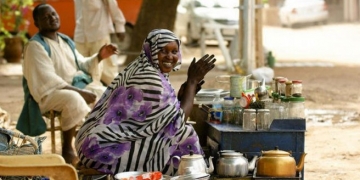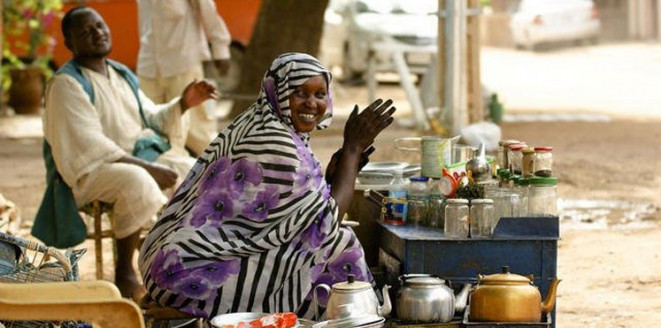
Khartoum: Aida Gissees
She looked indifferent her mind seemed wandering away . She kept looking at the ground; her hand on her cheek, mind absolutely distracted . She came to herself by somebody’s voice calling her “Halima where is your mind wandering?”. She was herself again alert to what was going on around her. Her dilemma was the coming days soon to come; the fear of the unknown. The Sudanese government announced that the country would be subjected to a stage of comprehensive lockdown starting from the eighteenth of April until mid-May, i.e. three weeks.
Halima is one of the workers in the market who earn their living in every day terms. “sustaining today to today” in a struggle maintain her living via what is known to marginal occupations. Although the state announced that the decision of the lockdown was in the interest of the citizen, many of the low income workers considered it a stab on the back, regarding that the government did not provide them with the least essential needs.
Halima, the tea saleswoman, told (afroshongir) that she was already confused about how she would spend the lockdown period (three weeks) as she will not be working to obtain the necessary needs as she depended on a daily revenue which she used to spend in buying the required (bread, meat) , vegetables, oil and soap) and other necessary needs, confirming that working in selling tea is considered “day to day livelihood”. She added that she had not been able to store sufficient items to help her or her family to over go the ban .She blamed the responsible authorities for not thinking about the low income workers who could not obtain in advance the necessary needs to stay home revealing that The lockdown coincided with a month that it described as difficult and highly costive in its living requirement (Ramadan). Halima went on to say, “We trust in God and goodness is in what God has chosen.”
Many ill-informed daily workers are worried about how the lockdown will pass. One of the woman workers came on foot from Bahri to Al-Ardhah Street, Omdurman, carrying bags containing bread, vegetables and other items in her hands, carrying wood on her head and without warning she stood in front of me and said “Do not stand here, you will not find transportation, so do not waste your time waiting.” At that time the curfew was to began at 6 pm. It was due … I replied that I was tired of walking and I could not walk any more. She was right, as at the street long there was no public transportation seen except some cargo trucks that offered transporting citizens.
We waited a little longer on the hope that some helpful person would be kind enough to offer us a lift .It was not a long time before a truck stopped and the driver signed to us to get in for a lift but before we got in, the vehicle had been over thronged by the people who rushed from everywhere to catch. Despite that we hurled ourselves among others on the back of the truck . Then we chatted and talked specifically about Corona pandemic, which swept the world and the comprehensive lockdown that the country would enter. My companion explained her fear of not being able to earn much during the open hours noting that she was in charge of several children . She assured me that she would try work as hard as possible to operate within the seven-hour period during which the movements within the neighborhoods is permitted that is from (7_1) noon, indicating that she lived in the outskirts of Omdurman and that she could move to the adjacent neighborhoods to wash clothes or clean the houses.
Men and women did not stop moving and breaking the curfew completely in light of the recurring and worsening crises in bread and gas, as the streets and markets witnessed a wide movement of citizens in order to obtain their necessary needs, especially since there are open shops and markets . But what was most noteworthy was the great numbers of women who search for some institutions and benevolent people who provide them with the bag of Ramadan .. There are those who have queued up in front of some of the benevolent houses in order to obtain some cash to afford buying things urgently needed.
In view of the global economic movement, this pandemic continues to harm the global economy, so the effects on the rate of growth (or rather the recession) and the job market appear negative to the most optimists, and this is confirmed by both the expectations of the International Monetary Fund, the World Bank and the Organization for Economic Cooperation and Development, and so far they consider the economic crisis resulting from this pandemic is deep, insofar as it is unique in the history of the contemporary economy, says Oxfam, and with regard to Africa, the organization confirms that nearly 50 million people on the continent face the risk of food insecurity due to the repercussions of the spread of the Corona pandemic between May and August 2020.















